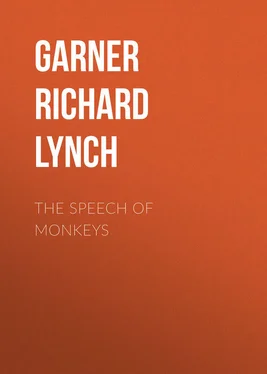Richard Garner - The Speech of Monkeys
Здесь есть возможность читать онлайн «Richard Garner - The Speech of Monkeys» — ознакомительный отрывок электронной книги совершенно бесплатно, а после прочтения отрывка купить полную версию. В некоторых случаях можно слушать аудио, скачать через торрент в формате fb2 и присутствует краткое содержание. Жанр: Природа и животные, foreign_antique, foreign_prose, на английском языке. Описание произведения, (предисловие) а так же отзывы посетителей доступны на портале библиотеки ЛибКат.
- Название:The Speech of Monkeys
- Автор:
- Жанр:
- Год:неизвестен
- ISBN:нет данных
- Рейтинг книги:4 / 5. Голосов: 1
-
Избранное:Добавить в избранное
- Отзывы:
-
Ваша оценка:
- 80
- 1
- 2
- 3
- 4
- 5
The Speech of Monkeys: краткое содержание, описание и аннотация
Предлагаем к чтению аннотацию, описание, краткое содержание или предисловие (зависит от того, что написал сам автор книги «The Speech of Monkeys»). Если вы не нашли необходимую информацию о книге — напишите в комментариях, мы постараемся отыскать её.
The Speech of Monkeys — читать онлайн ознакомительный отрывок
Ниже представлен текст книги, разбитый по страницам. Система сохранения места последней прочитанной страницы, позволяет с удобством читать онлайн бесплатно книгу «The Speech of Monkeys», без необходимости каждый раз заново искать на чём Вы остановились. Поставьте закладку, и сможете в любой момент перейти на страницу, на которой закончили чтение.
Интервал:
Закладка:
We find in them the rudiments from which all the faculties possessed by man could easily develop, including thought, reason, speech, and the moral and social traits of man. In brief, they appear to have at least the raw material out of which is made the most exalted attributes of man, and I shall not contest with them the right of such possession.
CHAPTER IV
Pedro's Speech Recorded – Delivered to Puck through the Phonograph – Little Darwin learns a new Word.
PEDRO THE CAPUCHINIn the Washington collection there is a little Capuchin by the name of Pedro. When I first visited this bright little monk he occupied a cage in common with several other monkeys of different kinds. All of them seemed to impose upon little Pedro, and a young spider monkey in the cage found special delight in catching him by the tail and dragging him around the floor of the cage. I interfered on behalf of Pedro, and drove the spider monkey away. On account of this, Pedro soon began to look upon me as his benefactor, and when he would see me he would scream and beg for me to come to him. I induced the keeper to place him in a small cage to himself, and this he seemed to appreciate very much. When I would go to record his sounds on the phonograph, I held him in one hand, while he would take the tube in his tiny black hands, hold it close up to his mouth, and talk into it just like a good little boy who knew what to do and how to do it. He would sometimes laugh and always chatter to me as long as he could see me. He would sit on my hand and kiss my cheeks, put his mouth up to my ear and chatter just as though he knew what my ears were for. He was quite fond of the head-keeper and also of the director, but he entertained a great dislike for one of the assistant-keepers, and he has very often told me some very bad things about that man, but I could not understand them. I shall long remember how this dear little monk would cuddle up under my chin, and try so hard to make me understand some sad story which seemed to be the burden of his life. He readily understood the sounds of his own speech which I repeated to him, and I have made some of the best records of his voice that I have ever succeeded in making of any monkey, some of which I have preserved up to this time. They present a wide range of sounds, and I have studied them with special care and pleasure because I knew that they were addressed to me in person; and being aware that the little creature was uttering these sounds to me with the hope that I would understand them, I was more anxious to learn just what he really said to me in this record than if it had contained only some casual remark not addressed to me. This little Simian was born in the Amazon Valley in Brazil, and was named for the late Emperor.
PUCK AND THE PHONOGRAPHA short time ago I borrowed from a dealer in Washington a little Capuchin called Puck, and had him sent to my apartments, where I kept a phonograph. I placed the cage in front of the machine upon which I had adjusted the horn, and had placed the record of my little friend Pedro. I concealed myself in an adjoining room, where I could watch the conduct of my subject through a small hole in the door. I had a string attached to the lever of the machine and drawn taut through another hole in the door, so that I could start the machine at any desired moment, and at the same time avoid attracting the attention of the monkey, either by my presence or by allowing him to see anything move. After a time, when everything was quiet, I set the machine in motion and treated him to a phonographic recital by little Pedro. This speech was distinctly delivered through the horn to Puck, from whose actions it was evident that he recognised it as the voice of one of his tribe. He looked at the horn in surprise and made a sound or two, glanced around the room and again uttered a couple of sounds as he retired from the horn, apparently somewhat afraid. Again the horn delivered some exclamations in a pure Capuchin dialect, which Puck seemed to regard as sounds of some importance. He cautiously advanced and made a feeble response, but a quick, sharp sound from the horn seemed to startle him, and failing to find any trace of a monkey, except the sound of a voice, he looked at the horn with evident suspicion, and scarcely ventured to answer any sound it made. When I had delivered to him the contents of the record I entered the room again, and this seemed to afford him some relief.
PUCK'S VOICE AND ACTIONSA little later I adjusted my apparatus for another trial, and this time I hung a small mirror just above the mouth of the horn. Then retiring again from the room I left him to examine his new surroundings, and he soon discovered the new monkey in the glass and began to caress and chatter to it. After a while I started the phonograph again by means of the string, and when the horn began to deliver its Simian oration it appeared to disconcert and perplex Puck. He would look at the image in the glass, then he would look into the horn; he would retire with a feeble grunt and a kind of inquisitive grin, showing his little white teeth, and acting as though in doubt whether to regard the affair as a joke, or to treat it as a grim and scientific fact. His voice and actions were exactly like those of a child, declaring in words that he was not afraid, but betraying fear in every act, and finally blending his feelings into a genuine cry. Puck did not cry, but the evidence of fear made the grin on his face rather ghostly. Again he would approach the mirror, then listen to the sounds which came from the horn, and it appeared from his conduct that there was a conflict somewhere. It was evident that he did not believe that the monkey which he saw in the glass was making the sounds which came from the horn. He repeatedly put his mouth to the glass, and caressed the image which he saw there, and at the same time showed a grave suspicion and some concern about the one which he heard in the horn, and tried to keep away from it as much as possible. His conduct in this case was a source of surprise to me, as the sounds contained in the record which I had repeated to him were all uttered in a mood of anxious, earnest entreaty, which to me seemed to contain no sound of anger, warning, or alarm, but which, on the contrary, I had interpreted as a kind of love speech, full of music and tenderness. I had not learned the exact meaning of any one of the sounds contained in this cylinder, but had ascribed in a collective and general way such a meaning to this speech. But from Puck's conduct I was led to believe that it was a general complaint of some kind against those monkeys in that other cage who had made life a burden to little Pedro. One thing was clear to my mind, and that is that Puck interpreted the actions of the monkey which he saw in the glass to mean one thing, and the sounds which he heard from the horn to mean quite another.
FORM OF SPEECH USED BY MONKEYSI do not think that their language is capable of shaping sentences into narrative or giving any detail in a complaint, for I have never seen anything yet among them which would justify one in ascribing to them so high a type of speech; but in terms of general grievance it may have conveyed to Puck the idea of a monkey in distress, and hence his desire to avoid it; while the image in the glass presented to him a picture of his own mood, and he therefore had no cause to shun it. I do think, however, that the present form of speech used by monkeys is developed far above a mere series of grunts and groans, and that some species among them have a much more copious and expressive form of speech than others. From many experiments with the phonograph, I am prepared to say with certainty that some have much higher phonetic types than others. I have traced some slight inflections which I think beyond a doubt modify the values of their sounds. I find that some monkeys do not make some of these inflections at all, although the phonation of a species is generally uniform in other respects. In some cases it seems to me that the inflections differ slightly in the same species, but long and constant association seems to unify these dialects in some degree, very much the same as like causes blend and unify the dialects of human speech. I have found one instance in which a Capuchin had acquired two sounds which strictly belonged to the tongue of the white-faced Cebus. I was surprised when I heard him utter the sounds, and thought at first that they were common to the speech of both varieties; but on inquiry I found that he had been confined in a cage with the white-face for nearly four years, and hence my belief that he acquired them during that time.
Читать дальшеИнтервал:
Закладка:
Похожие книги на «The Speech of Monkeys»
Представляем Вашему вниманию похожие книги на «The Speech of Monkeys» списком для выбора. Мы отобрали схожую по названию и смыслу литературу в надежде предоставить читателям больше вариантов отыскать новые, интересные, ещё непрочитанные произведения.
Обсуждение, отзывы о книге «The Speech of Monkeys» и просто собственные мнения читателей. Оставьте ваши комментарии, напишите, что Вы думаете о произведении, его смысле или главных героях. Укажите что конкретно понравилось, а что нет, и почему Вы так считаете.












